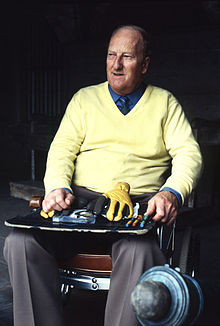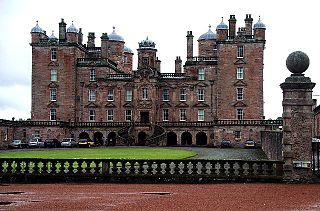Loading AI tools
Scottish politician From Wikipedia, the free encyclopedia
Walter Francis John Montagu Douglas Scott, 9th Duke of Buccleuch and 11th Duke of Queensberry, KT, VRD, JP, DL (28 September 1923 – 4 September 2007) was a Scottish peer, politician and landowner. He served in the Royal Naval Volunteer Reserve in the Second World War, and represented Edinburgh North in the House of Commons for 13 years.
The Duke of Buccleuch and Queensberry | |
|---|---|
 Portrait by Allan Warren, 1986 | |
| Predecessor | William Milligan |
| Successor | Alexander Fletcher |
| Born | Walter Francis John Montagu Douglas Scott 28 September 1923 |
| Died | 4 September 2007 (aged 83) |
| Spouse(s) | |
| Issue | 4, including Richard |
| Parents | |
| Member of Parliament for Edinburgh North | |
| In office 1960–1973 | |
| Personal details | |
| Education | Eton College |
He owned the largest private landed estate in the United Kingdom, covering some 280,000 acres (1,100 km2). The estate includes Drumlanrig Castle in Dumfries and Galloway, Bowhill House in Selkirkshire, and Boughton House in Northamptonshire. A fourth house, Dalkeith Palace, near Edinburgh, was most recently let to the West Central Wisconsin Consortium, which used the palace as a base for its study abroad program, until 2021.
Walter Francis John Montagu Douglas Scott was best known by his middle name John, and he was the only son of Walter Montagu Douglas Scott, 8th Duke of Buccleuch and 10th Duke of Queensberry, and the former Mary Lascelles. His sister Lady Elizabeth married the 10th Duke of Northumberland, and Lady Caroline wed politician Ian Gilmour.
His paternal aunt was Princess Alice, Duchess of Gloucester.
Known as Johnny Dalkeith, from his courtesy title of Earl of Dalkeith, he was educated at Eton.
In 1942, he joined the Royal Navy as an ordinary seaman, and was commissioned as an officer the following year, serving on destroyers. He continued as a lieutenant commander in the Royal Naval Volunteer Reserve and the Royal Naval Reserve after the war until 1971. He was awarded the Volunteer Reserve Decoration in 1959. He was appointed Honorary Captain in the Royal Naval Reserve in 1988. He was a Captain of the Royal Company of Archers, Lord President of the Council and Silver Stick for Scotland. He was a member of the Roxburghe Club.
After the war, he studied at Christ Church, Oxford, where he joined the Bullingdon Club. He briefly worked as a merchant banker in the City of London, and then as a director of an insurance company.
As Earl of Dalkeith, he was a Roxburghshire County Councillor from 1958. He contested Edinburgh East in the 1959 general election, losing to the incumbent Labour MP George Willis, but was elected as a Unionist (and latterly Conservative) Member of Parliament for Edinburgh North from a by-election in 1960. He served as Parliamentary Private Secretary to the Lord Advocate, William Rankine Milligan, from 1961 to 1962, then briefly as PPS to the Secretary of State for Scotland Jack Maclay from January 1962 to July that year. After Maclay was sacked in Harold Macmillan's Night of the Long Knives, he was PPS to Maclay's successor, Michael Noble, from 1962 to 1964. He defeated a young Robin Cook in the 1970 general election.
He and his wife sustained minor injuries in a car accident at Clumber Park, Nottinghamshire, on 16 August 1961, but made a full recovery. However, in a hunting accident near Hawick on 20 March 1971, his horse threw him off as it failed to take a drystone dyke, and then fell on him. Dalkeith was left paralysed from the chest down with a fractured spine. He left hospital in early September 1971, and spent the rest of his life in a wheelchair, and became a notable spokesman for disability organisations. He was the first MP after the Second World War to enter the House of Commons chamber in a wheelchair, where he was greeted by Harold Wilson, who crossed the floor of the chamber to shake his hand, in October 1971.[1]
Dalkeith left the House of Commons in October 1973, as he succeeded to the Dukedom upon his father's death. As a result, he stood down as an MP. However, he remained a member of the House of Lords for the next 25 years, where he spoke particularly on rural, disability and constitutional issues, until the removal of the hereditary peers in the reforms of 1999.


The royal family reportedly wanted Princess Margaret to marry Dalkeith, but she was not interested.[2] On 10 January 1953 he married Jane McNeill at a ceremony at St Giles Cathedral in Edinburgh attended by the Queen, the Duke of Edinburgh, and most of the royal family.[3] Jane, a leading fashion model for Norman Hartnell, was the only child of John McNeill, QC, and the former Amy Yvonne Maynard.[4] Together, they were the parents of four children:[5]
The Duke was in the headlines in October 2003 when the Madonna with the Yarnwinder by Leonardo da Vinci was stolen from Drumlanrig Castle. It was found in October 2007, one month after the Duke's death.[6]
The Duke died after a short illness at one of his three homes, Bowhill House, in Selkirkshire, Scottish Borders, in the early hours of 4 September 2007. He was survived by his wife, daughter, and three sons (ten grandchildren and two great-grandchildren). The Duke was buried on 11 September 2007 among the ruins of Melrose Abbey, next to his parents. His cousin the Duke of Gloucester was among the 2,500 guests who attended the burial ceremony.
 |
|
Seamless Wikipedia browsing. On steroids.
Every time you click a link to Wikipedia, Wiktionary or Wikiquote in your browser's search results, it will show the modern Wikiwand interface.
Wikiwand extension is a five stars, simple, with minimum permission required to keep your browsing private, safe and transparent.